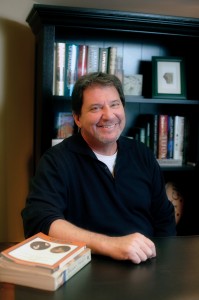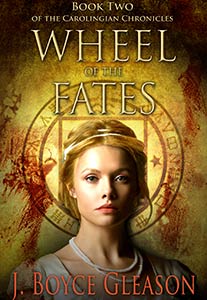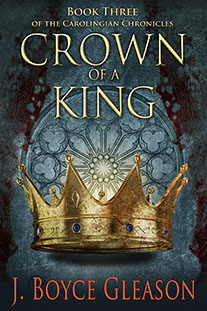The following interview with me originally appeared January 21, 2014 on Flashlight Commentary (http://flashlightcommentary.blogspot.com). 
Welcome to Flashlight Commentary. To start things off, please tell us a bit about Anvil of God.
It is a story about what happens to the family of Charles the Hammer when he dies. The power behind the Merovingian kings (recently made famous by Dan Brown’s Da Vinci Code) Charles wants to take the throne for his children. Only one thing stands in his way. He is dying. He tries to bequeath the kingdom to his three sons and marry his daughter off to a Lombardy prince (to secure his southern border), but the only thing to reign after he dies is chaos. Son battles son, Christianity battles paganism and his daughter must choose between love and her family’s ambition.
What inspired you to write this story?
I had studied Charlemagne in college and read the Song of Roland, an epic poem about one of Charlemagne’s greatest knights. I remember thinking that it would the basis for a great novel. I always thought that if I were to write a novel, I would start there. Years later when I finally decided to write it, I had to decide whether to follow the true history of Charlemagne and Roland or follow the legend. When I did the research, I fell in love with the history.
What research went into Anvil of God and did you discover anything particularly surprising while investigating the background material for you book?
Researching that period of history is a bit of a challenge. There are very few sources that bring all the pieces together into one place. I had to research Bavarian history, Alleman (German) history, Thuringian (Flemish) history, French history, Italian history, Church history. Then, after I had put the timeline together, I struggled with where to start. I couldn’t seem to find a good place. I kept moving back in time to discover something compelling that would capture my (and the reader’s) interest. I found that the story kept getting more interesting, the further back in time I moved. I ended up so far back in time, that the Anvil doesn’t even mention Charlemagne – it is the story of his parents and the conflicts that led to the family’s rise to power.
What drew you to this particular period and why use it as the backdrop of your story?
One story in particular captured my interest. Charles the Hammer’s daughter fled his court to find love amongst his enemies. It was, according to some historians, the biggest scandal of the Eighth century. How could that have come to pass? How did they meet? When did they fall in love? How did she get away? How did she cross the continent on her own? She must have been quite a character. When I read her story, I knew I had found a place to start.
Another question from my research begged an answer. I knew that Christianity had become the dominant religion on the continent (the Merovingian kings converted two centuries earlier), but so much of the Church history of that time period had to do with converting the pagans (and/or suppressing the pagans). How could that be? St. Boniface, who is a main character in the story, made his mark doing missionary work in what is now Germany and Bavaria. If Christianity was so dominant, why was all that missionary work necessary?
That led me to make the conflict of religions (and the power associated with it) a key factor of the story.
The historic record for this period is sketchy at best. How did you approach composing a novel from a story with so many unknown elements?
Actually, by writing the novel, I got to fill in the gaps. I knew what happened, but I didn’t know why. And you can’t understand why unless you figure out what motivates the people who shaped the history. So, when you get down to it. Anvil is a story about a family. And by telling their story – what motivates them, and the choices they make – the history falls into place. I didn’t try to write the history, I tried to tell the story of a family in crisis. Only this family’s choices affect an entire continent.
You probably have many, but is there one scene that you particularly enjoyed writing?
I enjoyed bringing to life a religion about which we know very little. Having been raised in the Catholic Church, I was very familiar with the rites and prayers that surround that faith. What rites and prayers would bring the pagan faith to life? There is a scene about mid-way through the book with a sibyl that seemed to come out of nowhere for me. It was so otherworldly, that I took great delight in writing it.
What scene posed the greatest challenge for you as an author?
The sex scenes were difficult, at first. So much has been written about sex – and so much of it poorly – that I struggled with finding the right tone. I didn’t want to have the characters kiss and then fade to black. I felt like it was dishonest for me as an author to shutter such a big window into their characters.
But the language for sex has been so overdone, I agonized over the first scenes I wrote. A writing professor eventually helped me out. She said sex between two people is so intimate that people create their own language for it; they establish their own rituals. So, if you are writing about sex, it must be intimate to that character. It must use language that that character would use. Writing about sex should provide a unique insight into the character. If you are writing to titillate you reader (or yourself for that matter) you are doing it for the wrong reasons. After I understood that, it became easy.
Sometimes fiction takes on a life of its own and forces the author to make sacrifices for the sake of the overall story. Is there a character or concept you wish you could have spent more time with or expanded on?
There were a lot of scenes that never made the final cut. My problem, as an author, (or so my editors tell me) is that I like to tell ALL the story. I take out the mystery. You see the story from every perspective. What they’ve taught me, is that sometimes it is better for the reader to wander around in the dark – just like the characters – to build some suspense for the resolution.
Fortunately, I have some good editors. Unfortunately, some of my favorite scenes had to be cut.
If you could sit down and talk with one of your characters, maybe meet and discuss things over drinks, who would you choose and why?
I would love to meet Charles. The man was a force of nature. He literally conquered a continent and saved Christianity in Europe. Bradius would be my second choice because his character is so complex. I’d love to see the world from his perspective – as painful as it is. I’d also love to meet Sunni, but I doubt she would take time to bother with me. She too was a force of nature and didn’t suffer fools lightly.
What do you hope readers come away with after reading your work?
I hope they put down the book and say “Wow! What a great story.” Then, I hope they say, “I can’t wait for Book II.”
Finally, what is next for you? Any new projects waiting in the wings?
I’m about halfway through Anvil’s sequel “Wheel of the Fates” which picks up the story two months after Anvil’s conclusion. I’m also working on a novel that is somewhat closer to our timeframe and perhaps more familiar to readers. It’s called “Sin of Omission.” It’s the not-so-pretty story of Ben Franklin as a young man.


